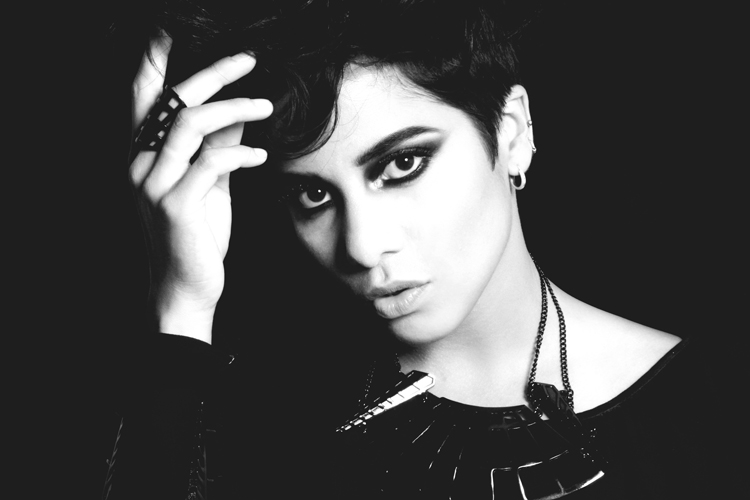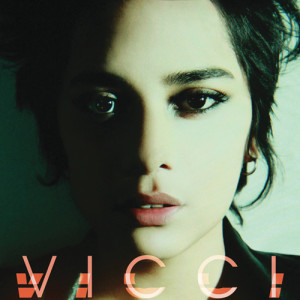
Vicci’s Voice

An interview with out singer/songwriter Vicci Martinez.
by Gregg Shapiro
Vicci Martinez had been at it for a while as an independent musician before she achieved the recognition she deserved. Having had mixed experiences with other TV talent competition shows, Martinez found her groove on the 2011 season of NBC’s The Voice. Championed by musician and Voice judge Cee-Lo Green, Martinez went on to place third on the show. The increased attention and acclaim not only substantially increased the size of Martinez’s following, but it also earned her a major-label record deal. The resulting disc, Vicci (Universal Republic), on which she “makes a statement” and “takes a stand,” serves as a showcase for her talents as both a singer and songwriter.
Gregg Shapiro: Vicci, I’d like to begin with your “My Journey” essay in the Vicci CD booklet. How important was it for you to include a statement such as this in the booklet?
Vicci Martinez: My manager and I thought it would be a cool idea, because this was my first major-label debut album—that’s why it was self-titled. People who have followed my career in the past [know that] I wear my heart on my sleeve, so a lot of people know me personally as well. I wanted to give the new audience a look into my life and where these songs are coming from and just who I am. I think there’s something special, at least for me, when I know more about an artist. It helps with that connection. To connect with the audience is one of the things that’s so important to me.
Do you think that your coming out at the age of sixteen was in any way influenced by the fact that you were a performer and saw that it was better to come out sooner rather than later?
I had seen Ellen DeGeneres and Melissa Etheridge go through that. I didn’t want to deal with that in my life. I wanted to come forward straightaway. That way, any audience I would gain would like me for me. I wouldn’t have to go through that issue with people not [liking me or] the music because of that. I wanted to be upfront right away.
 You mentioned Ellen and Melissa. Were there queer musicians whose coming-out experience you looked to for guidance or as an example?
You mentioned Ellen and Melissa. Were there queer musicians whose coming-out experience you looked to for guidance or as an example?
I’ve met some great artists through Olivia Travels—some older women who shared their stories with me. It’s inspiring to see what they’ve done for other gay people and people in general out there. [Their legacy is] something that I want to continue.
What would it mean to you to be considered a role model?
I’m happy to—that would be great. Music is a platform to say what you believe. You can share your feelings as well. There are opportunities to give people encouragement to do the same. When I was a kid, I would hear love songs that talked about admitting that you are in love with someone. I remember hearing those songs and those words and going to school the next day and being like, “I’m in love with you.” [Laughs] Dumb little things like that, that would give you the spark to go and do something yourself. If I can do that, I’m happy to. That’s why it’s important to me to have positive and inspirational messages in my songs as much as possible.
You also write honestly about participating in a TV talent show. Do you think that shows such as The Voice, on which you appeared, are here to stay and will be the way that audiences are introduced to new performers for years to come?
I think it’s definitely a platform that a little while ago used to be looked at negatively—even by other artists themselves. I was actually nervous about doing it. When I let go of the ego part of it, I was just going to go and be myself on the show. “I’m going to be out; I’ll let people know I’m gay. I’ll let people know the songs I want to sing and the way I want to look, and all that.” It was a huge opportunity. With that, I got signed, and I’m still being treated just like any other artist on our roster. [Talent shows are] something that more artists like me, that were maybe shy about it, are going to continue to use. It’s definitely working.
Would you say it was an easy transition to go from indie to major-label artist?
For me, I was ready to go to that next level. I had been running the ship for a long time. Financially, it’s hard to get your band on the road. It’s still financially hard. I’m getting the exposure with radio, but you still have to invest in your brand, you still have to go out there and do a lot of things for free. Going on TV and radio shows, you don’t get paid for that. But that’s the other side of it. Reaching a large audience is very important, so I’m happy with it.
You co-wrote a majority of the songs on your most recent disc, your major label debut Vicci. What is involved in that process, and does it vary from collaborator to collaborator?
It definitely does. What I realize, too, is that in collaborating with these people it’s going to be my story, so I kind of have to figure out how I want it. Even if I’m going into their space and their studios, I have to be comfortable as well. When we narrowed it down to the people I actually worked with on the album, it was [with] those people that I felt I could be myself and be comfortable and be heard. That’s why the stories came out, and it was easy. It was easy to do because I was working with those right people.
Do you think you’d collaborate with some of these same people again?
Absolutely.
In what ways would you say that the Vicci CD differs from your previous releases?
[It’s] definitely a lot more radio-friendly, I would say. There are a lot more pop elements on the album, which is something I wanted to do. A lot of the production [happened while I was in the studio] because I wanted to learn how to do those things. Having all of those opportunities, being on a major label and having a bigger budget to get a record done, I went for it. I said, “Okay, whatever I can do, I want to do.”
Have you started thinking about or writing songs for the next disc?
Yes, definitely. There is a couple that we have written. I’m not sure if they’ll be used. We’re just starting now and getting ideas flowing. Knowing the direction that I want to go in will make the process not so hectic when I finally sit down and do it.
Gregg Shapiro also writes the GrooveOut column in this issue of OutSmart.











Comments